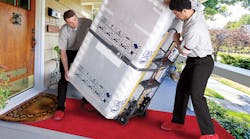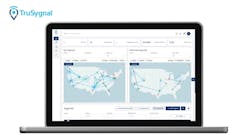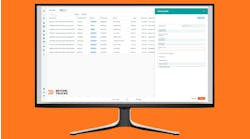The surge of e-commerce orders will continue to drive trends in business operations, delivery methods, and vehicle purchases.
That was the message during a Fleet Owner webinar from Tim Denoyer, vice president and senior analyst of ACT Research Co., and Al Hemmelgarn, director of operations for wholesale distributor Pollock.
“More established trucking and logistics companies are stepping in to handle some of the large packages increasingly being ordered online,” said Denoyer. He referenced J.B. Hunt Transport Services and XPO Logistics as among the companies that have stepped into the e-commerce space to deliver orders to homes from stores and distribution centers.
While one piece of final-mile delivery revolves around moving oversized items like furniture, another challenge involves handling the growing number of lower-density shipments. That is leading to the creation of a new wave of delivery firms that are moving a small number of packages at a lower cost than parcel carriers.
"Sounds like a job for the gig economy," said Denoyer. It is also resulting in a lot of experimentation of drones, as well as electric and autonomous vehicles. Even as those futuristic methods mature, a big piece of the equation will remain customers picking up packages themselves.
“The family SUV will remain a big part of final mile,” Denoyer said.
As for Amazon, it will continue to remain major influencer on the entire market, he said. It continues to focus on an asset-light business model, and is finding ways “to build another very unique transport company.”
However, Denoyer was a bit skeptical of the Amazon Flex service, where customers grant permission to drivers to deliver packages inside their house to cut down on theft. While it is a novel idea, he said he does not think enough people will want strangers to access the house to be successful.
Hemmelgarn praised the customer service and on-time performance of most final-mile delivery specialists. He suggested they have proven themselves as a better option in the final-mile niche as compared with traditional less-than-truckload fleets. Hemmelgarn stressed the importance that customers place in the little details, such as the type of peanuts and boxes being used.
“Consumers feel the packaging of their shipments convey the value of the shipment,” he said, citing recent surveys. They also expect to be able to obtain updated delivery information with a single click.
Pollack has its own fleet of 62 trucks across the United States, and through use of dynamic routing has yielded a 15% efficiency improvement. That has allowed them to use fewer trucks to move the same amount of goods while improving on-time deliveries. The company offers delivery and packaging expertise, in addition to shipping tangible products in bulk.
The webinar was sponsored by Omnitracs LLC, a fleet management software provider.



